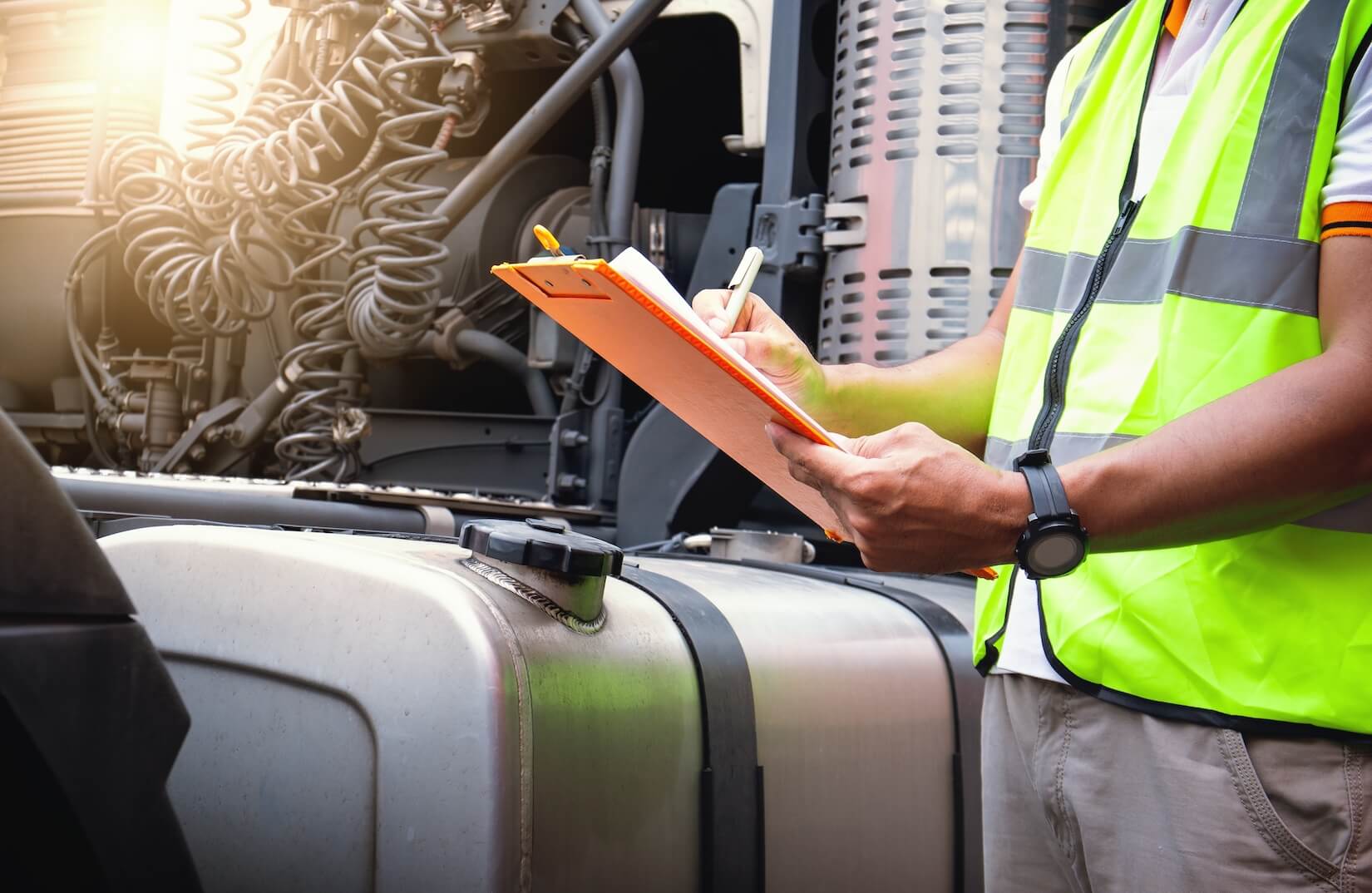Many questions and misconceptions swirl around DOT inspections for commercial vehicles. However, the laws have some nuances, and it’s essential to keep up with the ins and outs of DOT inspection protocol and filter out misinformation. For example, a common question is, “Does every DOT vehicle need an annual inspection?” Well, the fast answer is ‘yes’ and ‘no’. To fully answer this question, we’ll need to determine whether your vehicle meets inspection requirements, stays compliant with the law, avoids fines, and remains fleet-ready.
Whether you’re looking for official guidance or searching for a “DOT inspection near me,” we’ll help clarify which vehicles require a Department of Transportation (DOT) annual inspection, what that inspection includes, and how to ensure you meet the latest FMCSA standards.
What Is a DOT Inspection?
The federally required DOT inspection is a routine check that tests commercial vehicles for safety and adherence to federal rules. The Federal Motor Carrier Safety Administration (FMCSA) sets these criteria, which keep drivers, their trucks, and cargo safe on the road.
DOT inspections vary and are separated into levels or depths of the inspection. For example, Level III is a fundamental driver and vehicle check compared to the more in-depth complete Level I inspection that covers tires, suspension, lights, and parking brake system, to name a few. The annual DOT inspection — often called the Periodic Inspection — is required for many commercial vehicles and must be conducted by a qualified inspector filling out the official FMCSA annual inspection form.
Which Vehicles Are Subject to DOT Annual Inspections?
Not every vehicle needs a DOT annual inspection, but many do, mainly if it is used for commercial purposes. So, how do you know if your car qualifies?
A good rule of thumb is that if you operate a commercial motor vehicle (CMV) with a gross vehicle weight rating (GVWR) of 10,001 pounds or more, you’re required by the FMCSA to have a DOT inspection once a year. This also applies to:
- Vehicles used to transport hazardous materials that require placarding
- Passenger vehicles designed to carry nine or more people for compensation or 16 or more people not for compensation (like shuttle vans or buses)
- Trucks or trailers involved in interstate commerce that meet the weight threshold
If your vehicle falls into one of these categories, you must get a DOT inspection every 12 months and keep documentation proving the car’s passing.
If you’re unsure whether your vehicle qualifies or searching for a DOT inspection near me, it’s best to consult a certified inspection location or your state’s DOT office.
Are There Any Vehicles That Don’t Need an Annual DOT Inspection?
Yes — some vehicles are not required to undergo an annual DOT inspection. Generally, if your car:
- Weighs less than 10,001 pounds GVWR
- It is not used for commercial purposes
- Doesn’t transport hazardous materials
- Doesn’t cross state lines as part of a business
Most non-commercial vehicles, including personal vehicles, non-commercial pickups, and even small business vehicles under the weight limit (like delivery vans or work trucks), fall under these criteria and may not need this yearly check unless required by your state or local regulations.
Consequences of Skipping a Required Inspection
The annual DOT inspection is a legal requirement and shouldn’t be considered anything less. Alapsed or failed inspections have consequences.
- Fines and penalties: These fines can be substantial, and the penalties can include losing your driving privileges.
- Out-of-service orders: Your vehicle is immediately grounded until it’s compliant.
- Increased insurance rates or even policy cancellations: Failure to adhere to the DOT inspection regulations can reflect on your already high insurance rates or even result in cancellation.
- A negative impact on your CSA (Compliance, Safety, Accountability) score: This can affect your business reputation and ability to book jobs or contracts.
It’s not worth the risk — staying compliant keeps you, your business, and everyone else on the road safe.
Frequently Asked Questions
Do non-commercial trucks need a DOT inspection?
No — most non-commercial trucks under 10,001 lbs GVWR don’t need a DOT inspection unless required by your state. However, some states have commercial vehicle regulations, so always check locally.
Does a DOT inspection replace a state inspection?
Not necessarily. A DOT inspection focuses on federal safety compliance for commercial use, while a state inspection may check emissions or other local requirements. You may need both, depending on where you operate.
What’s the difference between DOT, FMCSA, and North American Standard (NAS) Inspections?
While people often use these terms interchangeably, they refer to different agencies and processes:
- DOT: The Department of Transportation is the federal umbrella agency responsible for all modes of transportation in the U.S., including highways, aviation, and rail.
- FMCSA: The Federal Motor Carrier Safety Administration is a division within the DOT that explicitly regulates commercial motor vehicles (CMVs) and oversees rules related to safety, compliance, inspections, and enforcement.
- DOT Inspection: Commonly refers to the annual vehicle safety inspection required by the FMCSA under DOT rules (per FMCSA §396.17). A certified mechanic usually performs this inspection, focusing primarily on the vehicle’s condition.
- NAS Inspection: The North American Standard Inspection is a roadside inspection protocol created by the Commercial Vehicle Safety Alliance (CVSA). It’s used by certified law enforcement or DOT officers across the U.S., Canada, and Mexico to inspect the driver and the vehicle. It includes various levels (Level I being the most comprehensive), and cars that pass may receive a CVSA decal valid for 3 months.
Play it Safe and Schedule Your DOT Inspection Today.
To meet DOT annual vehicle inspection requirements, carriers must ensure that each commercial motor vehicle undergoes a thorough vehicle-only inspection based on FMCSA inspection criteria. This involves checking all major vehicle components — including brakes, tires, lights, steering, suspension, and more — to identify defective components that could impact safety or compliance. A certified inspector must complete an Annual Vehicle Inspection Report, which should be retained for at least 14 months and presented upon request. While the annual DOT inspection cost may vary depending on the service provider, staying compliant helps avoid costly violations, enhances road safety, and ensures your fleet operates within federal guidelines.
DOT inspections are critical to keeping everyone safe, from drivers to vehicles to the general driving public. Should an accident occur, failing to provide proof of passing a DOT inspection can result in losing your business license or worse. If your vehicle qualifies, getting an annual inspection is the simplest way to stay compliant with federal laws and avoid costly surprises down the road.
Need help to schedule an inspection or to understand your compliance requirements? Reach out to Fleet Advisor — we’re here to help you stay safe, legal, and on the road when it’s time to get your vehicle inspected.
Go to shop for all your fleet maintenance needs in Denver and the surrounding areas. Our years of experience have led us into this venture, a one-stop shop for all your fleet’s needs.


